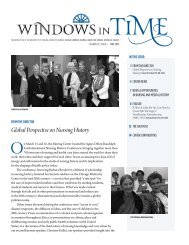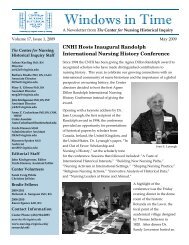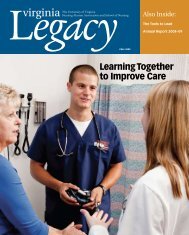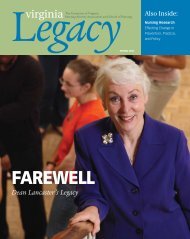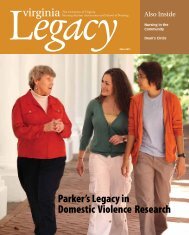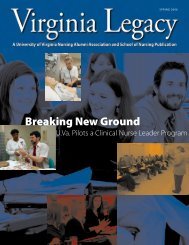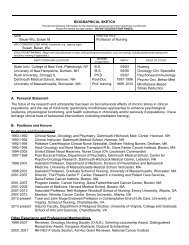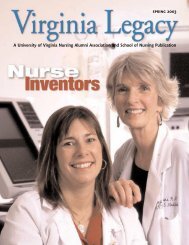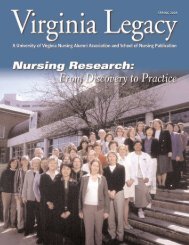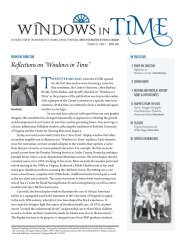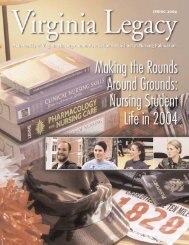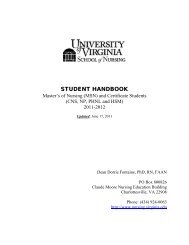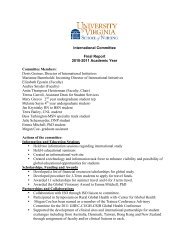Transforming McLeod Hall - School of Nursing - University of Virginia
Transforming McLeod Hall - School of Nursing - University of Virginia
Transforming McLeod Hall - School of Nursing - University of Virginia
You also want an ePaper? Increase the reach of your titles
YUMPU automatically turns print PDFs into web optimized ePapers that Google loves.
on how to manage challenging situations such as high-risk births<br />
or allergic reactions to dyes and medications. Through our research<br />
at the center, we hope to see what causes certain issues and then<br />
change how we teach and practice based on what we’ve learned. It’s<br />
another way that we can serve the greater good.”<br />
Changes Under Way<br />
Thanks to the generous contributions <strong>of</strong> <strong>School</strong> <strong>of</strong> <strong>Nursing</strong> alumni,<br />
faculty, and friends, the first phase <strong>of</strong> the <strong>McLeod</strong> renovation is<br />
already under way. To complete the project, an additional $7.3<br />
million in private support is still needed.<br />
The initial phase <strong>of</strong> the <strong>McLeod</strong> renovation focuses on a<br />
complete overhaul <strong>of</strong> floors one, four, and five. The first milestone<br />
in the renovation will be the reopening <strong>of</strong> the first floor this fall.<br />
Floor one houses the Center for <strong>Nursing</strong> Historical Inquiry—one <strong>of</strong><br />
only a few centers in the country dedicated to the preservation and<br />
study <strong>of</strong> the history <strong>of</strong> nursing and health care. Within its extensive<br />
collection, the Center for <strong>Nursing</strong> Historical Inquiry includes<br />
resources on health crises <strong>of</strong> the past, such as flu pandemics,<br />
that may reveal new insights for future public health threats. The<br />
move to the first floor will provide more room for vital collections<br />
and better space for researchers to work. <strong>McLeod</strong>’s first floor will<br />
retain its existing auditorium, along with technologically enhanced<br />
classrooms. Nearby, a new c<strong>of</strong>fee bar and café will foster informal<br />
gatherings among faculty, students, and interpr<strong>of</strong>essional colleagues<br />
from next door in medicine and the sciences.<br />
The fourth floor <strong>of</strong> <strong>McLeod</strong> will house the Center for the Study<br />
<strong>of</strong> Complementary and Alternative Therapies. This center evaluates<br />
and shares information about nontraditional complementary and<br />
alternative health care practices and products for managing pain and<br />
pain-related symptoms, a rapidly growing area <strong>of</strong> interest. Also on<br />
this floor, faculty collaborating within the Rural Health Care Research<br />
Center will conduct and share studies focused on the health care<br />
needs <strong>of</strong> impoverished individuals, racial and ethnic minorities, and<br />
the elderly living in rural areas. This research is a particular strength<br />
at UVA, partially because <strong>of</strong> its location in a largely rural area with<br />
extensive health needs. The fourth floor will also provide space for the<br />
nursing oncology research team. This group looks at a variety <strong>of</strong> issues<br />
related to cancer care, including the effectiveness <strong>of</strong> hospice care.<br />
Floor five will house the Center for <strong>Nursing</strong> Research, which<br />
facilitates the development <strong>of</strong> research activities across the <strong>School</strong><br />
<strong>of</strong> <strong>Nursing</strong>; and the Health Care Product Evaluation Center, which<br />
provides impartial, systematic, and in-depth evaluation <strong>of</strong> medical<br />
devices and products in development. Also on the fifth floor, the<br />
Southeastern Rural Mental Health Research Center will pursue its<br />
mission <strong>of</strong> improving the availability and quality <strong>of</strong> mental health<br />
care for rural minority persons, the elderly, seriously mentally ill<br />
adults, and women and children.<br />
Both the fourth and fifth floors will include <strong>of</strong>fices for faculty<br />
and staff. The fifth floor will also include rooms equipped with video<br />
technology and other computing capabilities that facilitate efficient<br />
and cost-effective collaboration with researchers at other institutions.<br />
From the<br />
Front Lines<br />
Assistant nursing pr<strong>of</strong>essor<br />
Cathy Campbell knows the<br />
importance <strong>of</strong> great working<br />
space. She also feels strongly<br />
about having her mentor and<br />
colleagues working close by. Cathy Campbell expects the <strong>McLeod</strong><br />
renovation to accelerate research<br />
Campbell is a researcher<br />
progress.<br />
with the Rural Health Care<br />
Research Center. Since<br />
coming to UVA, she has benefited from the mentorship <strong>of</strong> Patricia<br />
“Pat” Hollen, the Malvina Yuille Boyd Pr<strong>of</strong>essor <strong>of</strong> Oncology<br />
<strong>Nursing</strong>. With Hollen’s assistance, Campbell has successfully<br />
acquired internal UVA research funding and external funding from<br />
the American Cancer Society and the NIH National Cancer<br />
Institute for her research.<br />
Why is completing the renovation <strong>of</strong><br />
<strong>McLeod</strong> <strong>Hall</strong> important to you?<br />
My current research focuses on end-<strong>of</strong>-life decision making<br />
among rural and ethnically diverse patients in hospice care.<br />
Outcomes from our studies could significantly improve care and<br />
reduce suffering for many individuals with cancer and other<br />
diseases who are approaching the end <strong>of</strong> their lives. But, because<br />
<strong>of</strong> our lack <strong>of</strong> space, it can sometimes be hard to get to the<br />
research. For example, my research assistant has no dedicated<br />
workspace. Today, she started work in a conference room at the<br />
end <strong>of</strong> hallway. Someone then needed the conference room, so I<br />
let her use my <strong>of</strong>fice. Every morning, that’s how my day starts:<br />
thinking about where to put my research assistant and not about<br />
how to advance our research.<br />
The current lack <strong>of</strong> space slows down productivity. It’s difficult to<br />
get the physical resources you need—or even to find the people<br />
you want to talk to because they’re located in so many different<br />
places, and always moving around. E-mails and phone calls are<br />
not enough. We need space to sit down and review drafts and<br />
discuss ideas with our colleagues.<br />
My mentor, Dr. Hollen, is across the street at the Claude Moore<br />
<strong>Nursing</strong> Education Building. Another colleague is working upstairs,<br />
and another is working out <strong>of</strong> the Cancer Center. When the<br />
renovation is complete, we will have all <strong>of</strong> our resources together<br />
in one place—including our administrative support. It will make it<br />
easier for us to collaborate with each other and with researchers<br />
from other institutions. We will have sufficient <strong>of</strong>fice space and a<br />
central conference room where we can get together and talk<br />
about new projects or the status <strong>of</strong> ongoing projects.<br />
www.nursing.virginia.edu <strong>Virginia</strong> Legacy 9 •



